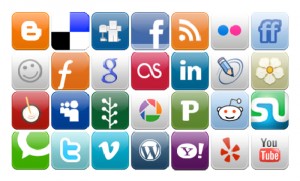 Not only is our world moving faster and faster these days, it is also becoming more connected than ever. And it looks like the corporate world has finally gotten the message.
Not only is our world moving faster and faster these days, it is also becoming more connected than ever. And it looks like the corporate world has finally gotten the message.
For the past few years, I have been talking to clients and keynote audiences about the importance of embracing social media as an additional communications channel; ideal for marketing, collaborating, and engaging with stakeholders internally and externally. While some companies have eagerly jumped on the bandwagon, many have resisted, for a variety of reasons. That appears to be changing.
According to Forrester Research, an independent research company that provides marketing, business and technology advice to business leaders, over the next five years social media marketing will grow at an annual rate of 34% – faster than any other form of online marketing, and double the average growth rate for all online mediums. Even more telling, during that time span business spending on mobile media marketing will increase three-fold, while spending on social media will increase more than four times.
What’s behind this sudden anticipated increase in business usage of social media?
Remember when the Internet first burst upon the scene and everyone proclaimed it as the greatest thing since sliced bread? Well, a lot of companies lost a lot of money trying to figure out how to use it effectively. It took nearly a decade for people to learn how to turn it from a novelty item into a highly effective business tool. Not just in terms of selling products online, but as a powerful communications tool the likes of which we had never seen before.
It took a while to understand that the real power of the Internet was its ability to make information ubiquitous. Once we learned how to use the Internet to put information in the hands of the people who need it any time, anywhere in the world, it revolutionized the way we conduct business.
Social media is now going through the same learning curve, only it’s happening much faster. Business leaders have figured out that there’s a lot more to social media than the ability to connect with people through Facebook or keep friends updated on our whereabouts via Twitter. We’re discovering how to use the multitude of channels and platforms to change the way we position our products and services in the marketplace and how to build beneficial relationships with prospects, customers, and other key stakeholders.
What have we learned so far? That social media has tremendous potential in three key areas:
Brand building and monitoring. Brand building used to be a one-way activity. With social media, it has become two-way. Customers are already talking about you and your products and services on social networking sites. Creating “official” social media channels allows you to participate in those conversations and have some control over how your brand is perceived by the market. It also allows you to monitor what the market is saying about your competitors and what they are doing. When you monitor consistently, you can gather valuable competitive intelligence and better understand emerging unmet customer needs.
Attracting traffic. Companies that depend on online searches for potential customers to find them are now using social media profiles to improve their rankings with search engines. Major search engines like Google and Bing incorporate information from blogs and social networking sites into their process for ranking web sites. Social media bookmarking tools like Reddit and Digg enable you to generate traffic by posting blogs and linking and/or responding to blogs and articles. Videos posted on YouTube, the world’s second largest search engine, and similar sites can also be optimized for search engine indexing. Today, if you don’t show up in a search, you don’t exist.
Finding new customers. Creating a company profile and posting blogs, articles, and other information about market trends and issues positions you as an expert in your industry. Regular updates about your business on your personal social media accounts can spark others to send business your way. But perhaps the best thing about social media is its ability to target very specific groups of prospects and customers and address their individual interests in a very personal way. People want to feel like they belong to something special. Social media allows you to build loyal followers and create a sense of community around your company and its products and services.
The initial learning curve has passed. Smart companies are no longer asking, “How can we use social media to increase business?” Instead they’re applying the lessons that have already been learned and are aggressively looking for ways to implement social media faster and better than their competitors.
If you have yet to embrace social media, the train is leaving the station. Will you be riding up front with the engineer, or will you get left behind on the platform?






